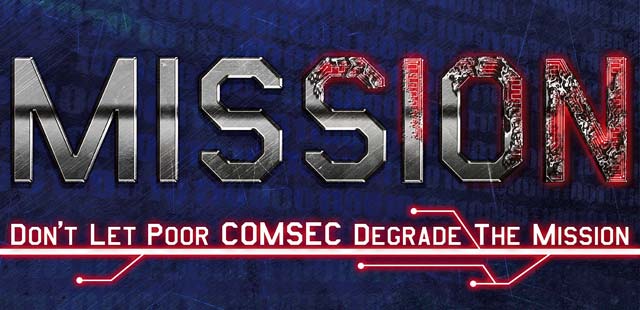
In an era when everything from banking, mass communication and shopping can be done in front of a computer screen, communications security is more important than ever. When that security involves the safety of service members around the globe, mistakes can be life-threatening.
The wing COMSEC office is responsible for providing safe and secure communication methods throughout Ramstein, but ultimately every Airman plays a role in cyber security.
“People should keep COMSEC in mind at all times, especially when dealing with classified material,” said Tech. Sgt. Ezequiel Rivera, 86th Communications Squadron COMSEC manager. “Loss or release of classified information could negatively affect the interest of national security. It could lead to an adversary gaining an advantage over the United States.
“Airmen need to ensure awareness of what constitutes a COMSEC incident and who they report incidents to if necessary,” he added.
COMSEC measures and controls are taken to deny unauthorized persons from accessing telecommunications. This includes crypto security, transmission security, emission security, traffic-flow security and physical security of COMSEC material.
“It is used to protect classified and unclassified traffic on military communication networks,” Rivera said. “This guarantees the authenticity of telecommunications, while still delivering the content to the intended recipients.
“Security issues that occur can vary,” he continued. “Minor breaches in COMSEC can be the destruction of material too late or too early without approval. Major breaches can be theft, unauthorized viewing, access or copying of classified material.”
While COMSEC is comprised of many different aspects, there are simple steps Airmen can take to ensure information assurance.
“Airmen shouldn’t download freeware, shareware or public software; they should check with the information assurance officer before downloading anything,” said Staff Sgt. Tobey Newby, 86th Comptroller Squadron information assurance officer. “They shouldn’t plug in devices that aren’t approved. They should also familiarize themselves with the computer emergency quick response aid by their desk.
“It’s everyone’s responsibility to protect the confidentiality, integrity and availability of the information we receive and information systems,” he added.
Airmen of the past and present learned to defend the skies, but now must learn how to defend cyber space from an ever present threat.
Though the threat seems less tangible than the enemies of the past, the damage it can do is quite real. Proper COMSEC practiced by every Airman will help prevent the damage and ensure the Air Force remains the world’s leading air, space and cyberspace power.
For more information or COMSEC concerns, contact the wing COMSEC office at 480-7776.







